

Kristin Freeling
I am a librarian at Windham High School in Maine.
COLLECTION: Anti-Racism Resources. Addressing Implicit Bias. Image from Manascan (2020) I must say that I have learned more about equity, diversity, bias, and inclusivity in the past year than I have during my entire adult education.
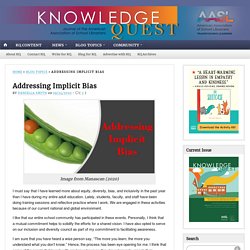
Lately, students, faculty, and staff have been doing training sessions and reflective practice where I work. We are engaged in these activities because of our current national and global environment. I like that our entire school community has participated in these events. Personally, I think that a mutual commitment helps to solidify the efforts for a shared vision.
I am sure that you have heard a wise person say, “The more you learn, the more you understand what you don’t know.” Ways School Librarians Can Serve Students in Fall 2020. If anything has been consistent about this time of social distancing, it’s the unpredictability of the future.
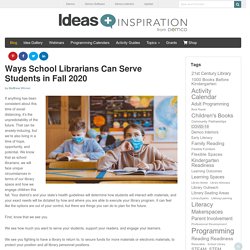
That can be anxiety-inducing, but we’re also living in a time of hope, opportunity, and potential. We know that as school librarians, we will face unique circumstances in terms of our library space and how we engage children this fall. Your district’s and your state’s health guidelines will determine how students will interact with materials, and your exact needs will be dictated by how and where you are able to execute your library program.
It can feel like the options are out of your control, but there are things you can do to plan for the future. First, know that we see you. We see how much you want to serve your students, support your readers, and engage your learners. We see you fighting to have a library to return to, to secure funds for more materials or electronic materials, to protect your position and all library personnel positions. LA Librarians Navigating School Library Programming in Face of COVID19. Tech against Coronavirus - a list to work and learn remotely. Vendor Love in the Time of COVID-19. Topsham Public Library. Stuck at home?
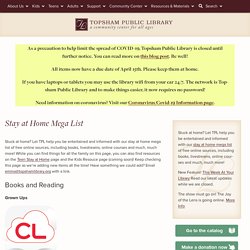
Let TPL help you be entertained and informed with our stay at home mega list of free online sources, including books, livestreams, online courses and much, much more! While you can find things for all the family on this page, you can also find resources on the Teen Stay at Home page and the Kids Resouce page (coming soon)! Keep checking this page as we’re adding new items all the time! Internet Archive’s National Emergency Library Harms Authors. The Authors Guild is appalled by the Internet Archive’s (IA) announcement that it is now making millions of in-copyright books freely available online without restriction on its Open Library site under the guise of a National Emergency Library.
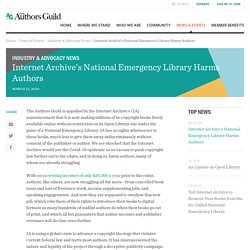
IA has no rights whatsoever to these books, much less to give them away indiscriminately without consent of the publisher or author. We are shocked that the Internet Archive would use the Covid-19 epidemic as an excuse to push copyright law further out to the edges, and in doing so, harm authors, many of whom are already struggling. With mean writing incomes of only $20,300 a year prior to the crisis, authors, like others, are now struggling all the more—from cancelled book tours and loss of freelance work, income supplementing jobs, and speaking engagements.
IA is using a global crisis to advance a copyright ideology that violates current federal law and hurts most authors. Background A Solution Without a Problem. Internet Archive responds: Why we released the National Emergency Library. Last Tuesday we launched a National Emergency Library—1.4M digitized books available to users without a waitlist—in response to the rolling wave of school and library closures that remain in place to date.
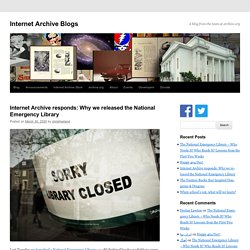
We’ve received dozens of messages of thanks from teachers and school librarians, who can now help their students access books while their schools, school libraries, and public libraries are closed. We’ve been asked why we suspended waitlists. On March 17, the American Library Association Executive Board took the extraordinary step to recommend that the nation’s libraries close in response to the COVID-19 outbreak.
In doing so, for the first time in history, the entirety of the nation’s print collection housed in libraries is now unavailable, locked away indefinitely behind closed doors. Ways School Librarians Can Serve Students in Fall 2020. Hangouts Meet cheat sheet - G Suite Learning Center. Coronavirus Misinformation Tracking Center – NewsGuard. Tips and Trends Summer20. More details on what's coming to Meet and Classroom. Spot missed citations with enhanced originality reports Originality reports, which are built into Classroom and Assignments, provide educators with flags for potential plagiarism in student work and also help students quickly identify passages that may need citations.
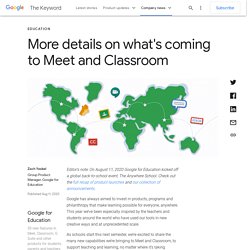
Now, we’re making originality reports even more helpful. First, we’re raising the number of originality reports that educators can use per class from three to five. (Educators with G Suite Enterprise for Education licenses will continue to get unlimited originality reports.) Educators will also be able to print, save and download reports to share with students, parents and administrators. What’s Your Plan? Slides - Google Slides. Conflict as Opportunity: Library Restorative Practices for Youth. Em Lane is a young adult services manager for Pima County Public Library.
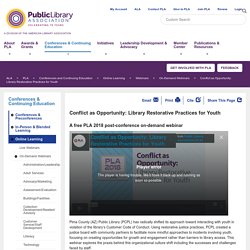
Em has worked in libraries for over a decade, having had the opportunity to serve youth for a majority of their career, earning the Extra Mile for Youth Award in 2015. Em is a founding member of the Restorative Practices for Youth Team and believes that all young library customers deserve to be given respect and opportunities for growth. Information Literacy in the Age of Fake News. Presented by: ISTE, Mackin Educational Resources, Rosen Publishing Group, Credo and School Library Journal Event Date & Time: Thursday, March 16th, 2017, 3:00 PM – 4:00 PM ET / 12:00 PM – 1:00 PM PT Our popular series returns with all-new presentations on technology in the education space, from helping struggling readers to sorting fact from fiction when it comes to digital information.
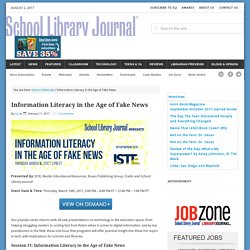
Overview Big6 by the Month, Aug. 22, 7-8 pm Eastern 8-22-13 7.03 PM. Helping Students Understand Media Literacy. Students today are increasingly turning to online news sources to meet their research needs.
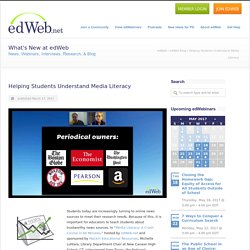
Because of this, it is important for educators to teach students about trustworthy news sources. In “Media Literacy: A Crash Course in 60 Minutes,” hosted by edWeb.net and sponsored by Mackin Educational Resources, Michelle Luhtala, Library Department Chair at New Canaan High School, CT, interviewed Greg Toppo, the National Education and Demographics Reporter for USA Today, on today’s shifting trends in journalism and how teachers can help students identify reliable sources. “Is there such a thing as objective journalism?” Asked Michelle, beginning the interview. Greg answered by explaining that good journalism should always include four qualities. It is also important to understand where good journalism comes from. In today’s world where so many people get their news through the internet, the news one sees on a daily basis can easily be filtered through clicks on a social feed. Series of Webinars. How Collaboration Helps School Leaders Succeed.
School leaders can use online networks and communities for their own personal professional learning, and to support collaboration with staff across schools and districts.
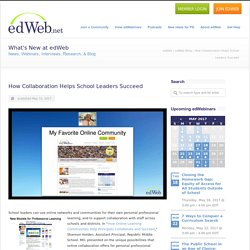
In “How Online Learning Communities Help Principals Collaborate and Succeed,” Shannon Holden, Assistant Principal, Republic Middle School, MO, presented on the unique possibilities that online collaboration offers for personal professional learning and within schools, and how school leaders can use edWeb.net for online collaboration with staff. As a personal tool, school leaders can use online communities to expand their network.
Meeting other professionals online builds personal learning networks, which help with keeping up to date on the latest in a certain topic or school initiative, allowing for more informed decision making within their own schools. Senior/Capstone Project: The Role of the School Librarian.
COLLECTION: Infographics. COLLECTION: Infographic Information & Creation. COLLECTION: Lateral Reading. COLLECTION: Citation Tools. COLLECTION: Lesson Plans and Instructional Resources. COLLECTION: Curriculum Mapping. COLLECTION: Assessment Resources. COLLECTION: Copyright, Fair Use, and Plagiarism. COLLECTION: Inquiry. COLLECTION: Differentiated Instruction Resources. COLLECTION: Primary Sources. COLLECTION: Flipped Learning Resources. Copyrights and Wrongs and Fair Use.
COLLECTION: Project-Based Learning (PBL) Resources. COLLECTION: Collaboration. COLLECTION: Behavior Management & Cyber-Bullying. COLLECTION: Digital Citizenship and Social Media Resources. COLLECTION: Documenting Your Impact on Student Achievement. Tech Tools. Resources for Teachers. University of the Arts and Teaching with Primary Sources.
Media Education Documentary Films and Educational Resources. MSLA Forum Newsletter - Massachusetts School Library Association. Welcome - Research Skills: Bridging the Gap Between High School and Post-Secondary LibGuide - LibGuides at Okanagan College. Forging a community of practice for digital library pedagogy: An update from the new Digital Library Federation Digital Library Pedagogy group.
Eleanor Dickson (University of Illinois) and Elizabeth Kelly (Loyola University New Orleans) are the founders and co-chairs of the Digital Library Federation (DLF) Digital Library Pedagogy group, launched in late 2015 with the goal of building a community of practice around teaching with and about digital collections. In this post, Dickson and Kelly report on the activities of the group, sharing themes that have emerged and offering opportunities to participate in next steps. The DLF Digital Library Pedagogy group’s founding reflects a growing interest within the DLF community in teaching with and about digital libraries. Many sessions at both the 2015 Liberal Arts Colleges Preconference and the DLF Forum in Vancouver centered on issues relating to instruction and digital libraries.
Discussions surrounding these sessions prompted the formation of the group, largely through word-of-mouth after the DLF Forum. Over 150 members have joined since the group formed in December 2015. Wisdom from the Old Master (May 2003) - Library of Congress Information Bulletin. By MARTHA H. KENNEDY Will Eisner (right) is introduced by Prints and Photographs Division Chief Jeremy Adamson at his April presentation at the Library. - Katherine Blood When Will Eisner published his groundbreaking book "A Contract With God" [1978], which consists of four long stories told in expressive illustration art with caption text and speech balloons, he coined the term "graphic novel" to describe it. Since then he has published 16 more. A legendary master of comic book art and visual storytelling, Will Eisner captivated an appreciative audience with his lecture on the graphic novel on April 1 at the Library of Congress.
Jeremy Adamson, chief of the Prints and Photographs Division, introduced Eisner and noted that he is one of the most influential comic book artists of all time. New Hope-Solebury HS Library Website.
COLLECTION: Bloom's Taxonomy. Research question worksheet new. COLLECTION: Promoting Reading. COLLECTION: Advocacy. PR for Libraries. Grant and Proposal Information for School Libraries. Toolbox for Facilities. Future Ready Librarians. ESSA. Technology in Education. Accessibility. LIBRARIAN LINKS. American Association of School Librarians Home Page Collection Development --from the Resources for School Librarians' web site CyberDewey --"A Hotlist of Internet Sites organized using Dewey Decimal Classification codes" Cyberlibrarians' Rest Stop --links for lessons on searching and researching. DeskRef: Quick Reference Links--Best Online Reference Sites--an excellent set of links for a wide variety of topics "Do We" Really Know Dewey?
The Dewey Rap ERIC Clearinghouse Resources --compiled by Gary Price.
Book Review sites. SLIS 705 Research Proposal Sites. Makerspaces. Professional Collection Past Year Additions: Maine State Library. Collection Management. COLLECTION: Blogs. COLLECTION: Standards, Big6, and Related Sites. Best Websites for Teaching & Learning 2017. The 2017 Best Websites for Teaching & Learning foster the qualities of innovation, creativity, active participation, and collaboration.
They are free, Web-based sites that are user friendly and encourage a community of learners to explore and discover. Gone but Not Forgotten The following sites have closed, reorganized, or become pay-based since being recognized as an AASL Best Website: The Learnia (Digital Storytelling) WebQuest. Useful WebQuest Resources. DataBasic.io. Smart Strategies for Student Success. Even students who’ve had years of active involvement in learning activities don’t automatically use strategies that best foster learning. Educational technology students schools libraries teachers parents staff development.
Why Instructional Design Must Focus on Learning Outcomes, Not Learning Activities. A Handy Visual Featuring The 7 Learning Styles.